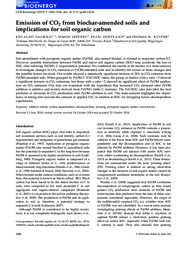Emission of CO2 from biochar-amended soils and implications for soil organic carbon.
Emission of CO2 from biochar-amended soils and implications for soil organic carbon.
Author(s): SAGRILO, E.; JEFFERY, S.; HOFFLAND, E.; KUYPER, T. W.
Summary: Soil amendment with pyrogenic organic matter (PyOM), also named biochar, is claimed to sequester carbon (C). However, possible interactions between PyOM and native soil organic carbon (SOC) may accelerate the loss of SOC, thus reducing PyOM?s C sequestration potential. We combined the results of 46 studies in a meta-analysis to investigate changes in CO2 emission of PyOM-amended soils and to identify the causes of these changes and the possible factors involved. Our results showed a statistically significant increase of 28% in CO2 emission from PyOM-amended soils. When grouped by PyOM C (PyC):SOC ratios, the group of studies with a ratio >2 showed a significant increase in CO2 emissions, but those with a ratio <2 showed no significant effect of PyOM application on CO2 emission. Our data are consistent with the hypothesis that increased CO2 emission after PyOM addition is additive and mainly derived from PyOM?s labile C fractions. The PyC:SOC ratio provided the best predictor of increases in CO2 production after PyOM addition to soil. This meta-analysis highlights the importance of taking into account the amount of applied PyC in relation to SOC for designing future decomposition experiments.
Publication year: 2015
Types of publication: Journal article
Unit: Embrapa Mid-North
Observation
Some of Embrapa's publications are published as ePub files. To read them, use or download one of the following free software options to your computer or mobile device. Android: Google Play Books; IOS: iBooks; Windows and Linux: Calibre.
Access other publications
Access the Agricultural Research Database (BDPA) to consult Embrapa's full library collection and records.
Visit Embrapa Bookstore to purchase books and other publications sold by Embrapa.

